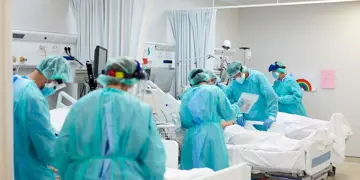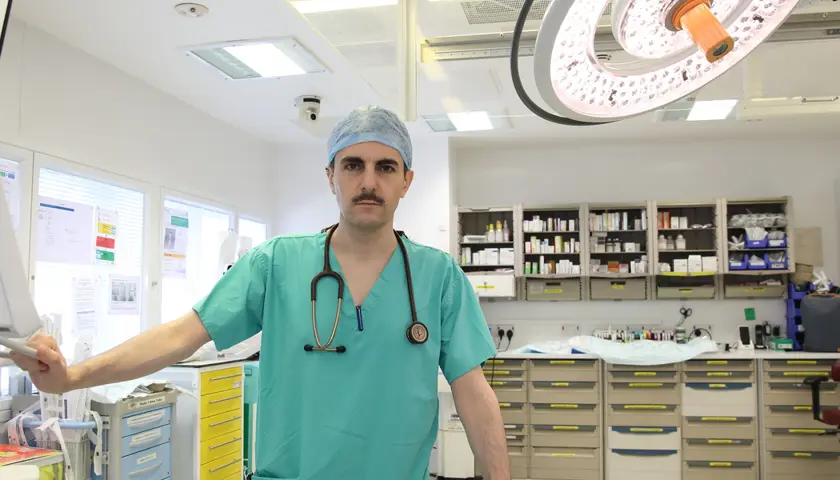Government response to Covid was ‘too little too late’, inquiry finds
Government response to Covid was ‘too little too late’, inquiry finds
Report says 23,000 deaths could have been avoided with earlier lockdown
There would have been about 23,000 fewer deaths in England during the first wave of Covid if the UK government had imposed lockdown a week earlier, according to the findings of the public inquiry into the handling of the pandemic.
Delivering the report of the second module in the inquiry, chair Baroness Hallett said the response from the UK government, and the devolved nations, was ‘too little too late’.
The report concluded that governments ‘failed to appreciate the scale of the threat or the urgency of response it demanded in the early part of 2020’.
It said that ‘had restrictions been introduced sooner, the mandatory lockdown from 23 March might have been shorter or not necessary at all’.
Modelling shows that, in England, there would have been approximately 23,000 fewer deaths in the first wave, up to 1 July 2020, had a mandatory lockdown been imposed a week earlier, on 16 March 2020. Put another way, this would have reduced deaths in the first wave by 48 per cent.
Covid was responsible for the deaths of 230,000 people in the UK.
The BMA, which is a core participant in the UK Covid inquiry, says the module 2 report ‘lays bare the catastrophic impact’ of governments’ ‘lack of urgency and collective complacency’.
Agreeing with Baroness Hallett’s view, the association says governments did ‘far too little, too late’ in the first few weeks of the pandemic.
Tom Dolphin, chair of BMA council, said: ‘As doctors who were looking after the sickest patients, my colleagues and I will recognise the report's findings a terrible indictment of the Government’s almost incomprehensible failings and incompetence.
‘The Government told the country and NHS workers that the measures they were putting in place would stop the NHS becoming overwhelmed; the report says otherwise. It also talks of ‘Misleading assurances from the Department of Health and Social Care that the UK was well prepared for a pandemic’. On the frontline, doctors and nurses could see the tidal wave of sick patients coming our way as we scrambled to be ready, even while the then prime minister was talking about shaking hands with patients.’
‘Too late’
The module 2 report said that the lockdowns in 2020 and 2021 ‘undoubtedly saved lives’ but ‘only became inevitable because of the acts and omissions of the four governments’ – none of which, it said, had adequately prepared for a lockdown or had a strategy for when or how they would exit lockdown.
The inquiry rejected criticism that governments were wrong to impose a mandatory lockdown on 23 March 2020, saying they each ‘received clear and compelling advice to do so’ – adding that ‘without it, the growth in transmission would have led to an unacceptable loss of life. However, their failure to act promptly and effectively had put them in this position.’
The report said there was ‘a toxic and chaotic culture’ at the centre of UK government during the pandemic.
It noted that politicians ‘did not take the pandemic seriously enough until it was too late’, describing February 2020 as a ‘lost month’ where little action was taken despite ‘clear warning signs’ such as the virus spreading to Italy.
There was no COBRA meeting chaired by the prime minister until 2 March 2020. Neither COBRA nor cabinet meetings were held in the February 2020 half-term holiday.
Then prime minister Boris Johnson was criticised for a ‘failure to appreciate the urgency of the situation’ which the report said was ‘due to his optimism that it would amount to nothing’ and ‘his attention being on other government priorities’.
This was ‘compounded’ by ‘misleading reassurances’ from cabinet and the Department for Health and Social Care, then led by Matt Hancock.
Had restrictions been introduced sooner, the mandatory lockdown from 23 March might have been shorter or not necessary at all
Report of module 2 of the UK Covid-19 Inquiry
The report noted how government had been given ‘clear advice’ that up to 80 per cent of the population would be infected in a worst-case scenario – and that the test and trace system was ‘inadequate for a pandemic’.
The report also said that ‘none of the four governments gave enough attention to the possibility of a second wave’, meaning there was ‘little contingency planning in place’.
In England, it said the restrictions imposed in summer 2020 were ‘weak’ and concluded that if a “circuit breaker” lockdown had been introduced in late September or early October the second national lockdown in England – which began on 5 November – ‘could have been shorter or possibly avoided entirely’.
It said that Scotland’s ‘quick introduction of stringent, locally targeted measures in the autumn meant ‘cases grew more gradually, avoiding a nationwide lockdown’.
BMA council chair Dr Dolphin said: ‘We are told that Boris Johnson had several things coming across his desk in early 2020 and the pandemic wasn’t even in the top five; weeks later he was still telling people to go about their normal business. All the while the death toll was slowly rising, no restrictions were in place, and a lack of PPE put healthcare staff at unacceptable risk in their day-to-day work.
‘What is clear from today’s report is that expert guidance about how quickly and easily the virus would be transmitted between people, even if they had no symptoms, was repeatedly ignored. A wilfully under-resourced test and trace capacity proves, as the report says, that “any opportunity to get on top of the pandemic had been lost”.’
Failure to consult
August 2020’s Eat Out to Help Out scheme, which did not require the mandatory wearing of face coverings despite the increased risk of infection with hospitality venues reopening, was ‘inconsistent’ with the UK’s overarching public health advice, the report found.
It noted that then-chancellor Rishi Sunak, who was behind the scheme, and then prime minister Boris Johnson, ‘failed to consult or inform other UK decision makers’, including the Covid-19 taskforce, which meant it was ‘devised in the absence of any scientific advice’.
Research by the University of Warwick found the scheme is estimated to have caused 8-17 per cent of new infections.
The BMA believes the government narrative presented a ‘false dichotomy’ between public health and the economy, which in reality are ‘inextricably linked’ and could have both been better protected by promoting precautionary measures such as ventilation and mask wearing.
Risky decisions
Baroness Hallett said ‘many of the same failings were repeated later in 2020’, which the report said was 'inexcusable'.
The report also concluded that the more transmissible ‘Alpha’ variant, which developed in late 2020, was ‘entirely foreseeable’ but all four governments ‘failed to recognise this threat and did not take action until infection levels were critical’ which ‘created a situation in which a return to lockdown restrictions seemed to them to be unavoidable’.
By March 2021, when the 'Delta' variant emerged, the report said that governments had ‘learned from the experience of earlier lockdowns’ and therefore had ‘delayed planned relaxations to allow time for the vaccine rollout to progress’ – in effect balancing the scale of infection against the additional protection the vaccine offered.
It said the spread of the less severe but much more transmissible ‘Omicron’ variant led to the deaths of 30,000 more people with Covid-19 in the UK between November 2021 and June 2022 despite the protection of the vaccine.
The decisions of all governments not to lockdown ‘had an element of risk’, the report said. Had the vaccines been less effective, or 'Omicron' as severe as previous variants, it said ‘the consequences would have been disastrous’.
‘Failed’ communications
The report also looked at the effectiveness of public health communications throughout the pandemic.
It concluded that the ‘Stay at Home’ campaign for the first lockdown was ‘effective at maximising compliance’ but ‘its simplicity had risks, such as discouraging those needing to seek help or medical treatment from leaving home’.
Complexity of regulations, and variations in rules, ‘made it difficult for the public to understand’ and allegations of rule breaking by ministers ‘undermined’ public confidence, it found.
The BMA says the UK government failed to provide clear, consistent and visible communications in its public health messaging, particularly after the first wave.
Dr Dolphin added: ‘The report reiterates that failures to manage the pandemic were down to government systems and processes as well as individuals. It also outlines several lessons learned and the BMA welcomes the emphasis on the need for future pandemic preparedness plans to have clear objectives and a set of detailed actions for those responding to the emerging crisis. Public health systems must also be restored and properly resourced to help avoid failure on this scale again.
‘From very early in the pandemic, the BMA was highlighting that those from minority ethnic backgrounds were at higher risk of severe illness or death, which was obvious to me and my colleagues in the hospital when we saw who was in beds in Intensive Care. We welcome the recommendation of a framework to better protect these and other vulnerable members of the community in future pandemics.
‘More widely, the experiences of doctors and other healthcare staff who were front and centre of the pandemic, including those still living with Long Covid, must not be ignored by those drafting strategies and plans to manage future pandemics.’
Recommendations
The report summarised the findings of the second module of the Covid inquiry, which has ten in total with the final report due no later than summer 2027. In her module one summary, chair baroness Hallett said the UK Government ‘failed their citizens’ through its insufficient preparations for a pandemic.
Recommendations in the module 2 report include:
- Improving consideration of the impact that decisions might have on those most at risk in an emergency.
- Broadening participation in SAGE (the Scientific Advisory Group for Emergencies).
- Reforming and clarifying decision making structures during emergencies.
- Ensuring decisions and their implications are clearly communicated to the public.
- Enabling greater parliamentary scrutiny of the use of emergency powers.
- Establishing structures to improve communication between the four nations during emergencies.
Baroness Hallett, chair of the inquiry, said: ‘In early 2020, Covid-19 was a novel and deadly virus spreading rapidly around the country. All four governments failed to appreciate the scale of the threat or the urgency of response it demanded.
‘When they did realise the scale of the threat, politicians and administrators in the UK government and the devolved administrations were presented with unenviable choices as to how to respond. Whatever decision they took there was often no right answer or good outcome. They also had to make decisions in conditions of extreme pressure. Nonetheless, I can summarise my findings of the response as “too little, too late”.’
She expects her recommendations to be implemented ‘in a timely manner’.




